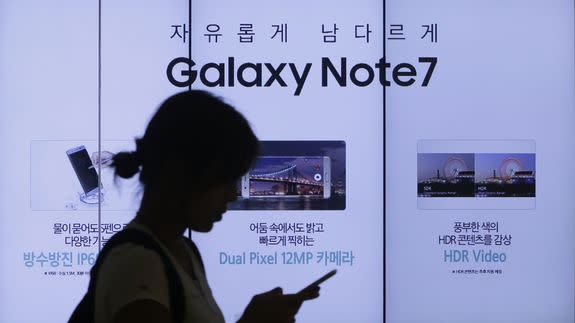Here's where the Note7 disaster will hurt Samsung most

There's never a good time for a $900 smartphone to explode in your face. But that doesn't mean there isn't a worst time — and Samsung's probably found it.
The company is set to recall its Galaxy Note7 phones following reports that the devices can overheat and explode. A child was reportedly burned by a Note7 this weekend, and one man says his jeep was incinerated when his phone combusted. Airlines are asking customers not to use Note7s while flying.
SEE ALSO: How the iPhone 7 Plus compares with Samsung's Galaxy Note7
It's a nightmare scenario for Samsung, which has built a reputation as the premium smartphone brand next to Apple. The company has to figure out what to do with 2.5 million Note7 phones, and it's doing so in the middle of the iPhone 7 launch.
Apple's new devices hit stores this Friday, giving disgruntled Note7 owners a unique opportunity to defect over to iOS.
"This is certainly going to affect Samsung's overall dominance in the high tier, just at the same time they're trying to get deeper into enterprise," William Stofega, a mobile analyst at the International Data Corporation, told Mashable.
"It's perfect timing for your competitor to take a share away from you," he added.
Samsung will probably suffer most in the United States and perhaps Western Europe, Stofega said. The company has positioned its most expensive phones as great for business customers — the Note7 includes a stylus, just like your old PalmPilot! — but the recall could lead people to try other phones, eroding the company's marketshare in certain regions.
A drop in the bucket — sort of
The Note7 crisis obviously isn't good for Samsung. But 2.5 million phones is a small fraction of the company's total smartphone business. For reference, it shipped 324.8 million smartphones in 2015, and its profits last year totaled more than $22 billion — considerably more than the $1 billion it might pay to replace affected Note7 devices.
Samsung releases a ton of devices worldwide that you may not even know about, like the Galaxy C5 — a value-priced phone for certain markets. The Note7 recall is no doubt damaging to Samsung's brand wherever its most expensive phones reign, but there's a big world out there.
Of course, that's not to say the Note7 isn't an important device. Handset makers like Samsung and Apple enjoy greater profit margins on high-end phones like the Note7 or iPhone 6S Plus. The point is that Samsung is insulated because it has a diverse portfolio of devices.
"Samsung is a volume player while Apple is not," Stofega explained. "This is why Apple is so eager to sell used phones in India."
In other words, exploding phones are never good — but, in a vacuum, they'd be relatively okay for Samsung, which has the biggest share of the world's smartphone market.
Of course, reality check: None of this is happening in a vacuum. Samsung stock has tumbled over the past couple of days, and there's speculation that airlines could ban all Samsung phones to avoid the hassle of identifying Note7s. You can imagine some customers souring on the Samsung brand altogether. And others are considering legal action against the phone-maker.
Still, it's worth considering that, technically, any lithium-ion battery could explode. Other devices have certainly gone up in flames.
No one can say for sure how things will develop from here for Samsung, but we can hope for safer batteries, at least. As Wired reported earlier this month, that research is already underway. That's good news for us but may be too little, too late for Samsung.
